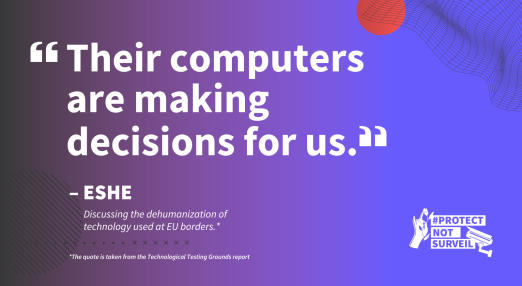AI
Filter by...
-

Open Letter: The AI video surveillance measures in the Olympics Games 2024 law violate human rights
In an open letter, EDRi, ECNL, La Quadrature du Net, Amnesty International France and 34 civil society organisations call on the French Parliament to reject Article 7 of the proposed law on the 2024 Olympics and Paralympic Games.
Read more
-

#ProtectNotSurveil: EU must ban AI uses against people on the move
As the European Parliament regulates the most harmful AI technologies, a coalition of civil society calls on the EU to #ProtectNotSurveil people on the move.
Read more
-

Emotion (Mis)Recognition: is the EU missing the point?
The European Union is on the cusp of adopting a landmark legislation, the Artificial Intelligence Act. The law aims to enable an European AI market which guarantees safety, and puts people at its heart. But an incredibly dangerous aspect remains largely unaddressed - putting a stop to Europe’s burgeoning 'emotion recognition' market.
Read more
-

Phone unlocking vs biometric mass surveillance: what’s the difference?
Facial recognition is one of the most hotly-debated topics in the European Union’s (EU) Artificial Intelligence Act. Lawmakers are more aware than ever of the risks posed by automated surveillance systems which pervasively track our faces – as well as our bodies and movements - across time and place. This can amount to biometric mass surveillance (BMS), which undermines our anonymity and freedom, and weaponises our faces and bodies against us. The article explores the types of biometric technology and their implications.
Read more
-

Remote biometric identification: a technical & legal guide
Lawmakers are more aware than ever of the risks posed by automated surveillance systems which track our faces, bodies and movements across time and place. In the EU's AI Act, facial and other biometric systems which can identify people at scale are referred to as 'Remote Biometric Identification', or RBI. But what exactly is RBI, and how can you tell the difference between an acceptable and unacceptable use of a biometric system?
Read more
-

New poll exposes public fears over the use of AI by governments in national security
EDRi’s affiliate European Center for Not-for-Profit Law (ECNL) commissioned a survey in 12 EU countries, where a representative sample of the public was asked about their opinion on the use of AI by governments. The poll has exposed public fears and shown stark differences with some of the positions taken by EU countries. Check out the results.
Read more
-

People working in the Czech media do not trust technology companies, they are also concerned about artificial intelligence decision-making
These findings come as a result of a survey conducted in the summer of 2022 as part of the Promoting human rights in the digital era project. The digital legal organisation and an EDRi member in the Czech Republic IuRe (Iuridicum Remedium) also took part.
Read more
-

Football fans are being targeted by biometric mass surveillance
Apart from its undemocratic nature, there are many reasons why biometric mass surveillance is problematic for human rights and footabll fans’ rights.
Read more
-

The EU AI Act: How to (truly) protect people on the move
The European Union Artificial Intelligence Act (EU AI Act) aims to promote the uptake of trustworthy AI and, at the same time, protect the rights of all people affected by AI systems. While EU policymakers are busy amending the text, one important question springs to mind: whose rights are we talking about?
Read more
-

Will the European Parliament stand up for our rights by prohibiting biometric mass surveillance in the AI Act?
On 10 May, EDRi and 52 organisations wrote to the Members of the European Parliament to ask them to ban the remote use of these technologies in publicly accessible spaces to protect all the places where we exercise our rights and come together as communities from becoming sites of mass surveillance where we are all treated as suspects.
Read more
-

Regulating Migration Tech: How the EU’s AI Act can better protect people on the move
As the European Union amends the Artificial Intelligence Act (AI Act) exploring the impact of AI systems on marginalised communities is vital. AI systems are increasingly developed, tested and deployed to judge and control migrants and people on the move in harmful ways. How can the AI Act prevent this?
Read more
-

Civil society reacts to European Parliament AI Act draft Report
This joint statement evaluates how far the IMCO-LIBE draft Report on the EU’s Artificial Intelligence (AI) Act, released 20th April 2022, addresses civil society's recommendations. We call on Members of the European Parliament to support amendments that centre people affected by AI systems, prevent harm in the use of AI systems, and offer comprehensive protection for fundamental rights in the AI Act.
Read more
